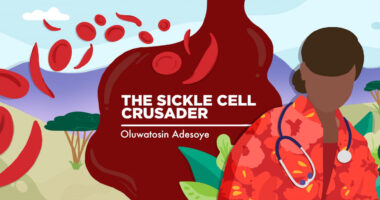Masitinib clinical program in SCD awarded €9.2M in France
Public funding granted to 19 innovative lab-to-patient medical projects

A clinical project designed to test whether masitinib, AB Science’s experimental oral therapy for sickle cell disease (SCD), can resolve complications associated with the inherited disorder has been awarded €9.2 million (about $10 million) in public funding in France.
The funding comes as part of a larger investment of €160 million (about $175 million) distributed across 19 awarded translational, or lab-to-patient projects by the National Research Agency’s Investments for the Future program and its Hospital-University Research in Health initiative.
Called SICKMAST, the masitinib project will be led by researchers at the Assistance Publique-Hôpitaux de Paris (APHP), in France.
“We are delighted to be among the laureates of this program, recognized for its extremely rigorous selection of innovative and medically impactful projects,” Olivier Hermine, MD, who will coordinate the SICKMAST project at APHP’s Necker-Enfants Malades Hospital, in Paris, said in a press release from AB Science.
A webcast with SCD experts will be held on Thursday, Nov. 30 to provide details on the SICKMAST project, according to a company webpage.
SICKMAST project aims to develop masitinib to resolve SCD complications
With the project grant, the researchers first will work to identify biomarkers of SCD-related complications that may benefit from masitinib treatment.
Then, the team will run a Phase 2 clinical trial to test the therapy in SCD patients identified based on such biomarkers. AB Science will supply masitinib and oversee its safety.
If the Phase 2 clinical testing succeeds, the company may decide to move on to Phase 3 development.
A new patent, if granted, may extend masitinib’s international protection in SCD into 2040. As part of a consortium agreement, AB Science would pay royalties to APHP on sales of masitinib, should it eventually be approved for the rare blood condition.
“We are very pleased with this collaboration with APHP, one of the largest promoters of clinical studies in France, whose research excellence is globally recognized,” said Alain Moussy, president and co-founder of AB Science.
“This project … opens an extremely promising new development avenue for masitinib and offers partnership prospects that we will explore to enable the registration and commercialization of masitinib in this indication under the best conditions,” Moussy said.
Sickle cell disease occurs when red blood cells become stiff and take on a sickle-like shape. As a result, they break down easily, leading to anemia. Having too few red blood cells can cause shortness of breath and fatigue, among other symptoms.
The sickling also makes red blood cells more prone to getting stuck in blood vessels and blocking blood flow. These episodes, known as vaso-occlusive crises, cause pain and can set the stage for future complications, such as acute chest syndrome.
Accumulating evidence suggests that mast cells, a type of immune cell that plays a key role in the inflammatory responses, may play a role in such complications. While no evidence in SCD is available, basophils, another type of immune cell involved in other diseases, also may contribute to SCD-related complications.
Masitinib is an orally available small molecule that belongs to a class of compounds called tyrosine kinase inhibitors — meaning they suppress the activity of tyrosine kinase enzymes. Given that these enzymes are key for the activation of mast cells and basophils, masitinib is expected to prevent SCD-related complications from occurring.
This project … opens an extremely promising new development avenue for masitinib and offers partnership prospects that we will explore to enable the registration and commercialization of masitinib [for SCD] under the best conditions.
The researchers will start off the SICKMAST project by searching a database of 1,500 patients for biomarkers of the role of mast cells and basophils in acute SCD and is disease complications.
After their validation, these biomarkers will be used to help identify SCD patients expected to benefit from masitinib treatment for a future Phase 2 trial that will evaluate the therapy’s ability to ease disease-related acute and chronic complications.
“This program should allow us to demonstrate the relevance of selectively targeting two key immune cells in the treatment of this disease and identifying patients most likely to respond through new biomarkers,” said Hermine, who is also a member of AB Science’s scientific committee.
AB Sciences also is testing masitinib for the treatment of neurogenerative diseases, including amyotrophic lateral sclerosis, multiple sclerosis, and Alzheimer’s disease, as well as some types of cancer and inflammatory and viral diseases.






